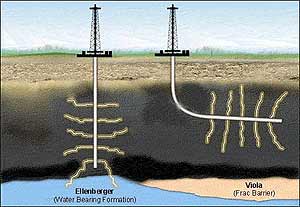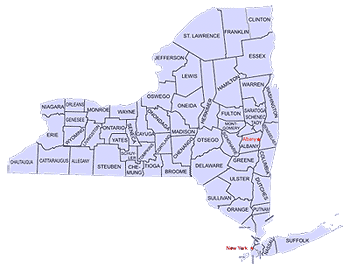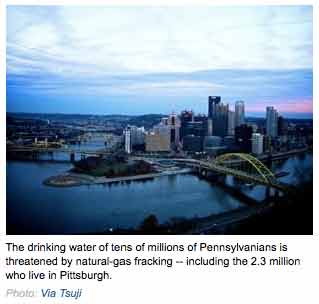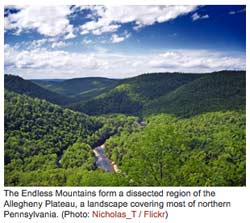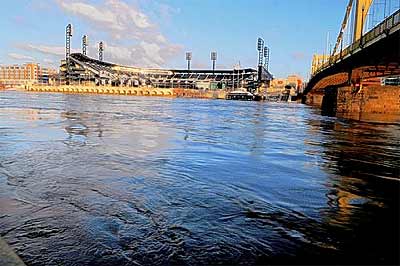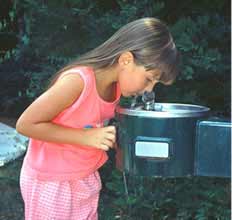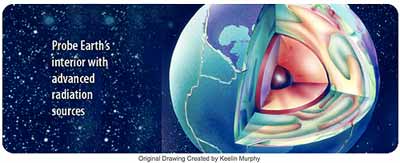Biblio
Protestors outside the Buffalo offices of the Department of Environmental Conservation today called for an executive order by Governor Andrew Cuomo to define fracking fluid as a hazardous waste and ban its treatment by municipal facilities...
Can local facilities adequately treat fracking fluid?
Small local facilities cannot adequately purify fracking fluid because it contains hundreds of chemicals, including known carcinogens, according to Rita Yelda of the Buffalo chapter of Frack Action, which organized the protest.
Yelda says water is also at risk because layoffs at the DEC could compromise the agency’s work to address fracking issues.
[At the Cornell 2011 Energy Conference]...Ithaca attorney Helen Slottje, from the Community Environmental Defense Council, addressed the nature of property rights.

Helen Slottje
“People often say, ‘It’s my property and I can do anything I want to,’” she said, adding that there is an overarching understanding of public welfare. In addition, property ownership does not grant a person the right to use his property in a manner that interferes with another’s use of his land.
“Each landowner has the right to quiet enjoyment of his property,” Slottje said. And the rights property owners have over activities conducted on their land change with time.
“A very fundamental property right is the right to exclude,” Slottje said. But New York law allows compulsory integration: the pooling of unleased landowners into drilling units when 60 percent of the land in a unit is leased.
When drilling into conventional reservoirs, where gas and oil flow from unleased land to the well, compulsory integration makes sense. But in shale, drillers must break the rock to release gas and that, said Slottje, involves a trespass.
This diagram, from Petrocasa, explains the widely held gas industry view, "Horizontal drilling also has less impact on the environment. With horizontal drilling, it's possible to extract gas from property adjacent to the well. That means that natural gas can be removed from under property without being on the surface of the land." (Neil Zusman 2011-04-20). For property owners who don't lease, how is this a good thing?
“When you are integrated, you are left with no right to exclude,” Slottje said. “You are left with toxic compounds beneath your land and you are not even compensated at market value.” [At this time integrated landowners are not paid for use of the land and receive the lowest possible royalty, 12.5 percent.]
Slottje warned municipal officials to avoid getting trapped into thinking they have to provide road use agreements. In a 1969 case, the courts found that a corporation’s claim to the right to profit was not greater than the residents’ right to not be impacted. What that means, she explained, is that no corporation has the right to use local residential roads for high-impact industrial traffic. New York law implies that communities can say “no” to heavy trucks, preserving residential roads for local use.
The biggest problem Slottje sees facing municipalities is the increased erosion of enforcement of environmental regulations. “So we’re swinging back to protecting the environment through property rights and home rule,” she said.
See: Cornell 2011 Energy Conference (New!)
See: Spectra Energy Watch
See: State Decision Blocks Drilling for Gas in Catskills
See: There’s Gas in Those Hills
See: Cornell Cooperative Extension (CCE): Landowner Information
See: Proposed gas drilling ban in city wins friends, foes such as Tom Ridge

Residents of Pittsburgh -- as well as potentially tens of millions of other everyday citizens in the Northeast corridor who rely on their taps to deliver safe water -- are consuming unknown and potentially dangerous amounts of radium in every glass of water. That's the buried lede in the Sunday New York Times' massive exposé on fracking, the relatively new process for extracting natural gas from the massive shale formation that stretches from Virginia to New York state.
Earthjustice is representing the Sierra Club, Damascus Citizens for Sustainability and the Lycoming County-based Coalition for Responsible Growth and Resource Conservation as proposed interveners in a proceeding before the Federal [Energy] Regulatory Commission (FERC), which has been asked to expedite approval of a proposed pipeline that would cut through portions of northeastern Pennsylvania. The groups are calling on federal regulators to thoroughly review the cumulative environmental impacts of the project before any decision is made.
See press release (Dec. 20. 2010): Groups Move to Intervene in PA Pipeline Project
Change.org, the website that allows users to create petitions for social change, received a legal threat from Peabody Energy after Coal Kills Kids (CKK) -- a group that partnered with the Yes Men to unveil a faux Peabody charity initiative earlier this week -- continued the hoax with a mock petition.
The petition was titled, "Stop Peabody Coal's Outrageous Coal Cares campaign," in mock outrage over the Coal Cares website that CKK developed in tandem with the Yes Men. The website claimed that Peabody had created a charity to "make asthma cool" by giving away free designer inhalers with themes like My Little Pony and The Bieber.
Peabody's lawyers contacted Change.org on May 12 and threatened to file suit if the fake petition against the fake website wasn't removed within 24 hours. "The lawyers seem as serious as an asthma attack," said Ben Rattray, founder of Change.org. The website agreed to remove the petition in order to avoid legal entanglement.
"I think Peabody probably made a mistake doing this," noted Change.org spokseperson Brain Purchia. "Because now it's drawing more attention to the problems that coal-burning power plants are causing."
The Yes Men and Coal Kills Kids received their own legal threat from Peabody, and they issued a response early this morning.
Here's what they wrote:
Dear Andrew Baum, Foley Lardner LLP, and Peabody Energy,
Thank you for your thoughtful letter demanding that we remove Peabody’s name from www.coalcares.org and cease falsely suggesting that Peabody cares about kids made sick by coal.
Your threat, although entirely baseless (see ... the EFF's blog post), did make us realize one thing: that Peabody, despite being our country's largest coal producer, and one of the largest lobbyists against common-sense policy, accounts for a mere 17 percent of U.S. coal production. The remaining 83 percent comes from 28 other companies, who are, every bit as much as Peabody, giving kids asthma attacks and other illnesses.
As even you may agree, the root of the problem is not Peabody, but rather our system of subsidies, regulations, and lobbying that lets your whole industry continue its lethal work. To make this clear, we have changed every instance of the word “Peabody” on www.coalcares.org to a rotating selection of the names of other large U.S. coal producers who, like Peabody, also need to be stopped from killing kids.
Very truly yours,
Coal is Killing Kids and the Yes Lab
See: Coal company gets punked by the Yes Men
See: The Yes Men
"We need to protect the water," Gov. Corbett said.
Pennsylvania regulators on Tuesday called on Marcellus Shale natural gas drillers to stop sending wastewater to 15 treatment plants, citing an increased risk of contaminating public drinking water.
The Department of Environmental Protection's action, while voluntary, will likely set the stage for a formal ban on the discharge of inadequately treated wastewater into the state's rivers...
DEP's announcement came the day after Corbett, who has been criticized for his close ties to drillers and his refusal to support a gas-production tax, assured local officials he would not allow the industry to "poison the water."
"We need to protect the water," the governor, a Republican, said at a meeting of the Pennsylvania State Association of Township Supervisors. "But we must do it based on science, not emotion."
...The DEP and the industry appear to have been influenced by complaints from public water suppliers in Western Pennsylvania, which say they are challenged by bromide levels whose concentrations have increased concurrently with the drilling boom.
The bromides themselves are not a public health risk - they account for a tiny part of the salty dissolved solids that create an unpleasant taste in water at elevated levels.
But bromides react with the chlorine disinfectants used by drinking water to form brominated trihalomethanes (THMs), a volatile organic compound.
See: Carbon County Groundwater Guardians | Pennsylvania
Studies have linked the prolonged ingestion of high levels of THMs to several types of cancer and birth defects.
Officials at several water authorities in the Pittsburgh area say their facilities have failed several tests for trihalomethanes in recent years.
See: Despite overhaul, gas wastewater still a problem
Americans overwhelmingly support government protection of the environment and consumers, a series of new polls shows. The findings come as efforts to enforce and expand regulation face increasingly hostile rhetoric from conservatives and industry representatives in Washington.
A new Society for Human Resource Management/National Journal Congressional Connection Poll (National Journal poll) found wide public support for legislation intended to limit climate-altering greenhouse gas emissions and to reform U.S. energy policy.
Sixty-five percent of poll respondents said they would support a bill that would cap greenhouse gas emissions. The same poll, conducted from July 29 to Aug. 1, found that 78 percent favor requiring utilities to produce more energy from renewable sources.
The House passed a climate and energy bill in June 2009. Senators have introduced several climate bills, but prospects for passage in 2010 appear dim.
See: Food and Water Watch
Frequently updated (daily) Pennsylvania blog by Michelle.
See: Wednesday, May 12, 2010. "New blog telling our stories"
Elizabeth Berkowitz, blogger for "How Should We Do The Mountain?" (and whom Protect the Endless Mtns recently joined forces with us on our Facebook page), has a fantastic new blog entitled "Faces of Frackland." Her new blog tells the stories of 20+ people and growing--stories documenting how the natural gas industry which has invaded our state is affecting actual local residents. For her efforts, Elizabeth was recently interviewed on WENY.
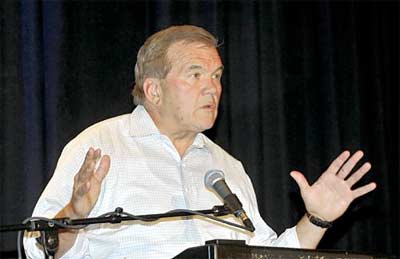
Diametrically opposed viewpoints on the Marcellus Shale boom competed for attention Tuesday with Pittsburgh City Councilman Doug Shields seeking a citywide ban on natural gas drilling and former Gov. Tom Ridge hailing the industry's "transformative opportunity" for Pennsylvania.
Despite questions about the legality of a ban, Mr. Shields unveiled a bill that would prohibit gas extraction anywhere in the city, even if drilling companies have already acquired leases from property owners. Speaking at a morning news conference at the City-County Building, Mr. Shields said drilling hearkened a return to Pittsburgh's polluted industrial past...
Last month, Mr. Ridge and his two consulting firms received a one-year, $900,000 contract to serve as strategic advisers to the Marcellus Shale Coalition, a Cecil-based trade group. However, the former two-term governor said he was approaching the job with the interests of his former constituents in mind...
...Mr. Shields described drillers as "quick-buck artists"; criticized their "paid mouthpieces," including Mr. Ridge; and said the city wouldn't be treated like a "colony" of a state government that puts the drilling industry's interests ahead of the people's. He also lashed out at Mayor Luke Ravenstahl, who opposes a citywide ban because of the economic development potential of gas extraction.
"I understand every government is strapped for cash, but that's not a reason to degrade the quality of life in our city and in our neighborhoods," he said.
See: Know Your Enemy | John Cole Cartoons
See: Pa. Governor Apologizes for Tracking Enviro Extremists, but Questions Remain - ProPublica
The Consortium for Materials Properties Research in Earth Sciences (COMPRES) is a community-based consortium whose goal is to enable Earth Science researchers to conduct the next generation of high-pressure science on world-class equipment and facilities.
COMPRES is charged with the oversight and guidance of important high-pressure laboratories at several national facilities, such as synchrotrons and neutron sources.
COMPRES is supported by the Division of Earth Sciences at the National Science Foundation.
Goncharov, Alexander. “Unanswered Questions in Deep Carbon Research” presented at the 2009 Annual Meeting keynote | Sloan Deep Carbon Cycle Workshop, Carnegie Institution, Geophysical Laboratory | Washington, D.C., May 15, 2008.
A. Kolesnikov, et al., "Methane-derived hydrocarbons produced under upper-mantle conditions". Nature Geosci., 2, 566-570 (2009).
"Our results support the suggestion that hydrocarbons heavier than methane can be produced by abiogenic processes in the upper mantle."
Recent work carried out at Carnegie/DOE Alliance Center (CDAC) suggests that substantial amounts of the hydrocarbon material could exist in the deep Earth and be formed by inorganic (or abiogenic) processes. These hydrocarbons, which include natural gas and petroleum, could migrate from the mantle to the near-surface region and contribute to 'fossil fuel' reserves. Read more about the work of Alexander Goncharov and colleagues from Sweden and Russia here.
A number of chemical reactions have previously been considered as a potential mechanism for hydrocarbon genesis, but they were not verified experimentally under conditions relevant to the Earth’s interior.
See: Sloan - Carnegie Institution for Science. 2008. Deep Carbon Observatory Founders Committee Meets: Needs and Opportunities in Deep Carbon Cycle Research.
To date, consideration of the global carbon cycle has focused primarily on near-surface (i.e., relatively low-pressure and temperature) phenomena, with the tacit assumption that oceans, atmosphere and shallow surface environments represent an essentially closed system with respect to biologically available carbon.
However, recent data and theoretical analyses from a variety of sources suggest that this assumption may be false.
See: Sloan - Carnegie Institution for Science. 2009. Hydrocarbons in Deep Earth?
The oil and gas that fuels our homes and cars started out as living organisms that died, were compressed, and heated under heavy layers of sediments in the Earth’s crust. Scientists have debated for years whether some of these hydrocarbons could also have been created deeper in the Earth and formed without organic matter. Now for the first time, scientists have found that ethane and heavier hydrocarbons can be synthesized under the pressure-temperature conditions of the upper mantle —the layer of Earth under the crust and on top of the core. The research was conducted by scientists at the Carnegie Institution’s Geophysical Laboratory, with colleagues from Russia and Sweden, and is published in the July 26, advanced on-line issue of Nature Geoscience.
Directed Energy Drilling (from MIT)
Mechanical drilling technologies are fully mature. New approaches are needed to make future major advances in increasing access to and reducing costs for underground energy resources...
...There may be other paths to open well stabilization, unimaginable by current mechanical drilling experience that could make possible record penetration into the Earth’s crust with directed energy sources.
The technology that has been developed by DOE and the world wide fusion energy research community to heat plasmas to 300 million degrees Centigrade opens up new possibilities for drilling that should be explored. (Woskov,Cohn 2009)
See: Center for Dark Energy Biosphere Investigations (C-DEBI)
Gold, Thomas. 1998. The Deep Hot Biosphere : The Myth of Fossil Fuels. New York: Springer | Copernicus, November 6.
Woskov, P., and D. Cohn. Millimeter Wave Deep Drilling For Geothermal Energy, Natural Gas and Oil. Annual Report 2009. Plasma Science and Fusion Center: Massachusetts Institute of Technology, September 2009.
Coalbed Methane (CBM) Develoment in Wyoming's Powder River Basin is Transforming the Landscape.
Wyoming's Powder River Basin is experiencing the largest mineral boom in Wyoming history. Coalbed methane (CBM) gas development in the Powder River Basin has been characterized by industry as the "hottest natural gas play" in North America, making CBM development the greatest environmental and cultural threat Wyoming has faced in decades.
This "gold rush" style pursuit of CBM is presenting enormous challenges for urban and rural citizens, ranchers and farmers, and impacted municipalities.
The Powder River Basin Resource Council has responded by providing landowners with information on how to protect their property through surface access and damage agreements (See Help for Surface Owners).
We have joined forces with other groups and landowners to oppose the damaging discharge of billions of gallons of water. EPA is now requiring additional evidence and signatures from landowners to ensure that discharges are truly beneficial.
Our appeal of discharge permits has halted the discharge of any new water into the Powder River drainage or the Tongue River drainage. Industry's "quick fix" solution has been to build large waste pits to store the water can lead to salt and sediment buildup, potential contamination of shallow aquifers and acreage out of production.
See Additonal Information and Concerns over Coalbed Methane Development in the Powder River Basin.
See C-Span Book TV Oct. 2, 2004. Bushwacked: Life in George W. Bush's America. Chapter: "Dick, Dubya, and Wyoming Methane." (152)
Get an in-depth pollution report for your county, covering air, water, chemicals, and more. Enter your zip code for local information.
Take Action: Oppose EPA's efforts to weaken pollution reporting
 |
Who are the top polluters in the U.S.? |
We think American citizens have a right to know what toxic chemicals are being released into their communities. But the EPA recently proposed to limit the information that companies are required to disclose about the hazardous chemicals they release into our environment.
By reducing the reporting requirements of its Toxics Release Inventory program, the EPA would take away an important tool for protecting public health and reducing industrial pollution.
Supported by Green Media Toolshed.
See: Big Polluters Freed from Environmental Oversight by Stimulus - The Center for Public Integrity
"...Walter Hang, president of Ithaca-based Toxics Targeting Inc., has been working with Pulteney residents on the wastewater issue. Even with Chesapeake's decision, the Pulteney saga proves this is a problem that has not been adequately addressed by DEC and others, Hang said.
-----"That was obviously a ridiculously bad location to put a deep well injection facility," he said. "Why would you ship that water hundreds of miles to the middle of nowhere and move it to within a mile of this historic jewel of a Finger Lake?""
Fracking will require the storage of frack wastewater in pits.
There are many fluids and wastes associated with oil and gas operations that can poison living organisms. This web page contains information on some of the following issues of concern related to the storage and disposal of oil and gas wastes:
- How pit pollution occurs
- Soil and water contamination from pits
- Wildlife and livestock mortality related to pits
- Toxic materials stored and disposed of in pits
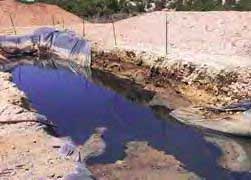
The mining of hardrock minerals — gold, uranium and other metals — on public lands in the West is governed today by the 1872 Mining Act. It has changed little since President Ulysses S. Grant signed it into law to encourage settlement of the West.
This 1872 law — on the books before the light bulb was invented — often gives metal mining special priority over recreation, ranching and conservation. It allows mining companies — even those that are foreign-owned — to take precious resources from public lands virtually for free, yet the oil, gas and coal industries have been paying royalties since the 1920s. And in what is arguably one of the great corporate giveaways of all time, claimholders can purchase public land at the rock-bottom price of $5 an acre or less. They do not even have to mine the property, but can use it — and have — to build hotels, condominiums and casinos.
Failure to reform this antiquated statute has proven costly to Americans. Mining is a messy business. The Environmental Protection Agency estimates that metal mining has contaminated more than 40 percent of western watersheds. Nearly half a million mine sites await reclamation, and the projected cost to taxpayers for cleaning up the pollution runs upwards of $50 billion.
A new rush of mining claims in the West is about to make the problem worse. A recent analysis of government records found a dramatic surge in claims, including hundreds of sites within miles of the Grand Canyon and other notable national parks such as Joshua Tree and Yosemite.
Modern mining needs a modern law. The Pew Environment Group’s Campaign for Responsible Mining is a national effort, launched in 2006, to take advantage of a unique opportunity in Congress to reform the 1872 Mining Act. The simple goal of this campaign is to encourage the adoption of a new framework for mining that compensates taxpayers, respects local communities and protects the environment.
See: Patrick Reis. NYT. Oct. 6, 2010. "W.Va. Sues Obama, EPA Over Mining Coal Regulations."
See also:
Wiseman, Hannah J. “Untested Waters: The Rise of Hydraulic Fracturing in Oil and Gas Production and the Need to Revisit Regulation.” Fordham Environmental Law Review 20 (2009): 115-170.
Horwitt, Dusty. "Drilling Around the Law: Drinking Water Threatened by Toxic Natural Gas and Oil Drilling Chemicals". Environmental Working Group, 2009.









